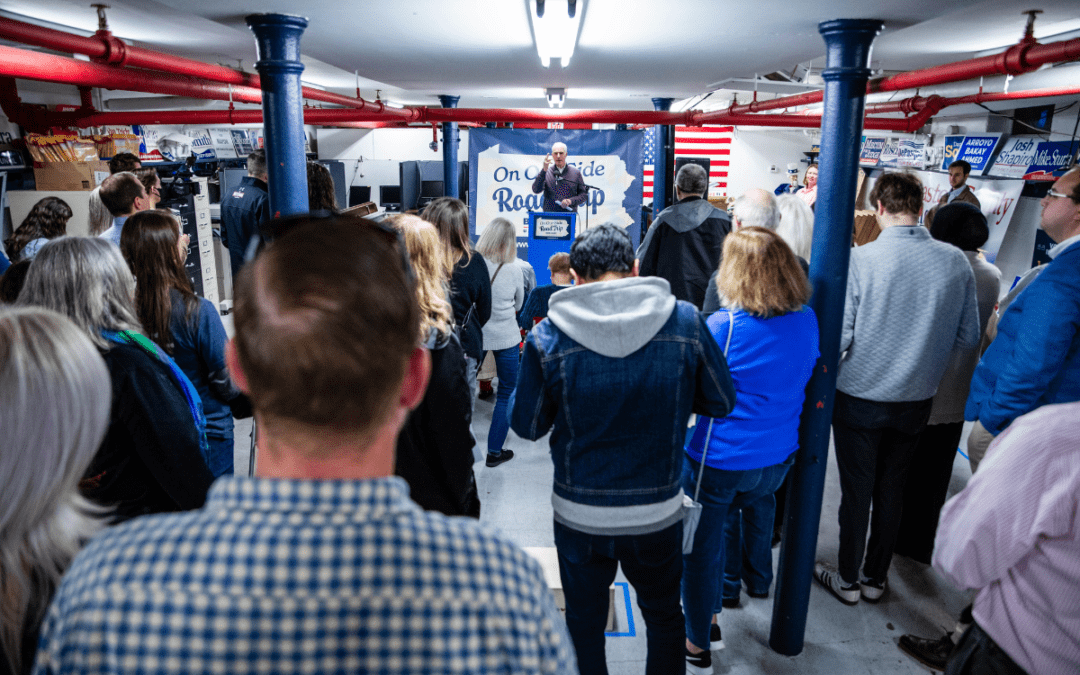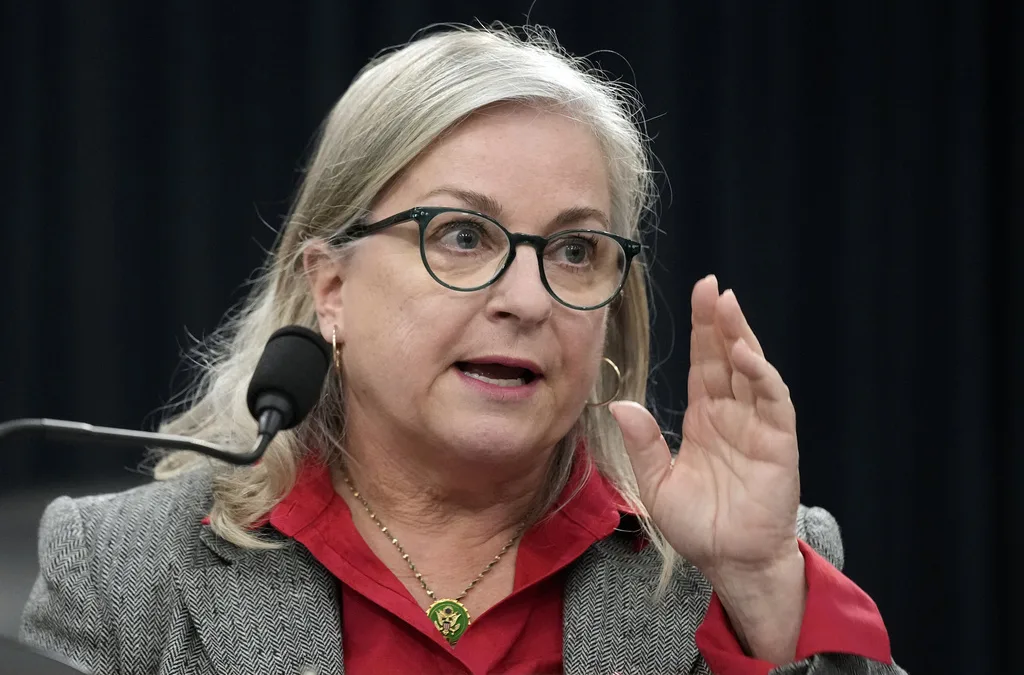
FILE - In this May 27, 2020 file photo, a worker processes mail-in ballots at the Bucks County Board of Elections office prior to the primary election in Doylestown, Pa. The counting from Pennsylvania's first foray into mass voting by mail was wrapping up on Tuesday, June 9 a week after the primary, with results of some of races still up in the air. (AP Photo/Matt Slocum, File)
The legislative standoff comes ahead of an election in which millions of Pennsylvanians are expected to vote by mail, rather than risk contracting the coronavirus by voting in person.
Pennsylvania counties are expected to begin mailing out ballots to voters in a matter of weeks, but Gov. Tom Wolf and Republican leaders in the legislature are still negotiating over how to update state voting laws to prepare for an expected surge of mail-in ballots that could delay the counting of votes and the declaration of winners.
Wolf, a Democrat, said on Monday that negotiations between his administration and Republican leaders were going “okay,” but acknowledged the two sides had yet to reach an agreement.
“There’s back and forth and I think there’s a real interest in having a conversation. This isn’t a one-sided conversation,” Wolf said during a news conference in Harrisburg. “There’s some different thoughts on how we ought to proceed on this, but both parties are really interested in doing this.”
Wolf’s comments came one week after Republicans introduced bills to effectively ban the use of mail-ballot drop boxes and move up the deadline to apply for a vote-by-mail ballot earlier, from seven days before Election Day to 15 days. These efforts would likely reduce the number of ballots rejected for arriving after Election Day, but would also give voters less time to request mail-in ballots and fewer avenues to return them, potentially disenfranchising some Pennsylvania residents.
Wolf came out against key aspects of the Republican plan.
“The governor is opposed to any proposal that would limit Pennsylvanians’ ability to vote,” Lyndsay Kensinger, Wolf’s spokesperson, told the Philadelphia Inquirer last week. “The governor will only support an election reform proposal that makes it easier and safer for Pennsylvanians to cast their ballots.”
Wolf has instead called on lawmakers to allow counties to begin processing mail-in ballots 21 days before Election Day. This would involve scanning and verifying ballot envelopes and voter signatures and scanning the ballots. Counties would not count or report vote totals until polls closed at 8 p.m. on Election Day.
Wolf also wants the legislature to change the law to require counties to count ballots that arrive up to three days after the Nov. 3 election, so long as they are postmarked by Election Day.
“These proposed reforms will further strengthen our elections, help people to vote safely from home, and assist counties in processing the surge in mail-in ballots,” Wolf said in a statement last week.
Democratic leaders in the state legislature have backed Wolf’s proposals, but Republicans have thus far opposed Wolf’s efforts and only want to allow counties to begin processing ballots three days prior to the election. They also want to allow poll watchers to serve in counties besides their own and poll workers to work within any location in their county, as opposed to just their home election district. They’re also pushing to require counties to contact any voters whose ballot signatures do not match what is on file, so they can have the chance to fix their signatures before their ballots are rejected.
The legislative standoff comes ahead of an election in which millions of Pennsylvanians are expected to vote by mail, rather than risk contracting the coronavirus by voting in person. With an influx of mail-in ballots, both Wolf and the legislature are working to avoid a scenario in which Pennsylvania, a key swing state, is unable to declare a victor for days, potentially delaying the presidential election result.
Recent policy changes at the Postal Service have only amplified these concerns. The new postmaster general, Louis DeJoy, instituted a series of cost-cutting measures such as reducing service, banning overtime for carriers, and removing mail-sorting machines and public collection boxes that have led to massive delays in mail delivery, sparking concerns about delays in the delivery of mail-in ballots. On Aug. 18, DeJoy rolled back some of the changes until after the election, but lawmakers, voters, and election officials still remain concerned that delays could cause many ballots to arrive after Election Day and put those ballots at risk of being discarded.
In addition to opposing the counting of delayed ballots, state Republicans want to limit where voters can drop off mail-in ballots to county courthouses, permanent election offices, and polling places. This places state lawmakers at odds with Philadelphia officials, who plan to use part of a $10 million election security grant from the Chicago-based Center for Tech and Civic Life to set up 15 satellite election offices and 15 drop boxes.
Republicans say state law does not allow for satellite election offices or drop boxes, but Democrats disagree. Wolf’s administration acknowledges that state law is silent on drop boxes, but argues that satellite election offices are allowed.
The GOP’s effort to outlaw drop boxes mirrors that of President Donald Trump’s. The Trump campaign is suing to ban drop boxes in Pennsylvania, and the president has falsely claimed that they “make it possible for a person to vote multiple times,” and that they were not “Covid sanitized.”
While they disagree on some measures, such as ballot boxes, Wolf and the GOP do share some common ground. Both sides want to change the law and require counties to begin sending mail-in ballots at least 28 days before the election, as opposed to the 14 days currently required.
If the two sides are unable to reach a larger compromise in the coming weeks, the state courts may have to settle some of these issues. But Wolf said on Monday that both parties want to reach an agreement as soon as possible, so that county election officials have time to comply with the changes.
“The conversations we’re all having with Republicans recognize that you can’t just wait until the last minute to do this,” he said. “So, we are talking now.”
The Associated Press contributed to this story.
Politics

Bob Casey: Past time to reign in corporations ‘jacking up their prices’
US Sen Bob Casey continued calling out corporate greed and price gouging at a canvass launch in the City of Lancaster on Sunday. Maintaining the...

Susan Wild calls out Republicans for holding up Ukraine aid
‘It’s not only shameful, but embarassing.” That’s what US Rep. Susan Wild (D-Pennsylvania) had to say about the Republican-led US House’s...

He said what? 10 things to know about RFK Jr.
The Kennedy family has long been considered “Democratic royalty.” But Robert F. Kennedy, Jr.—son of Robert F. Kennedy, who was assassinated while...
Local News

Conjoined twins from Berks County die at age 62
Conjoined twins Lori and George Schappell, who pursued separate careers, interests and relationships during lives that defied medical expectations,...

Railroad agrees to $600 million settlement for fiery Ohio derailment, residents fear it’s not enough
Norfolk Southern has agreed to pay $600 million in a class-action lawsuit settlement for a fiery train derailment in February 2023 in eastern Ohio,...






